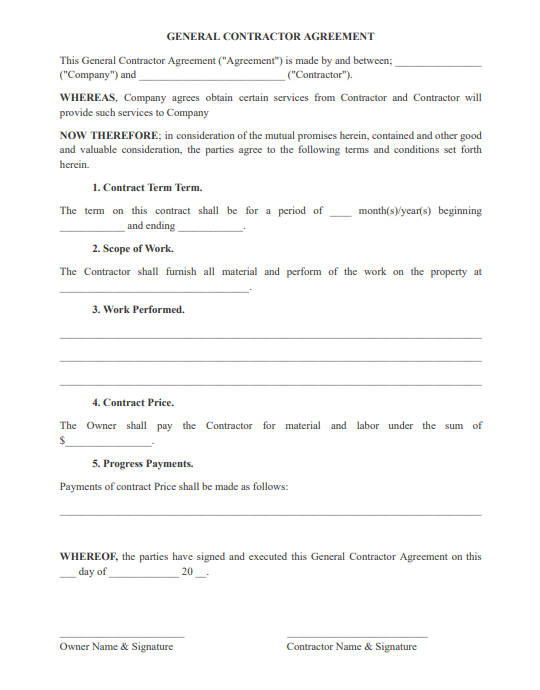A General Contractor Agreement is used by a contractor and a customer. It specifies the scope of work, the price of the project, and the time allowed for completion.
Here are some of the most important clauses in a Contractor Agreement and some of the negotiating points and things to consider with these clauses you should be aware of.
- First, Scope of work clause this lays out the work that the contractor is responsible for delivering in exchange for the compensation negotiated in the contract.
- Most important thing to consider in the scope of work clause is minimizing ambiguity in order to avoid litigation. You don’t want any dispute about what the contractor agreed to do vs. did not agree to do.
- Second is the Contract Price. There’s a couple of different ways you can structure the contract price. The simplest is a lump sum this provides certainty for the owner and an opportunity for additional profit for the contractor if they can keep their cost low but it also gives the contractor additional risk if things run higher than the lump sum.
- Unit pricing is consists of flat fees for various components of the work. So the more of one particular unit the owner wants the more of the work is going to cost but the owner has some certainty because they’re basically ordering a particular price for a particular unit of work.
- Cost of work plus the contractor’s fee takes into account, the actual cost of the work plus a fee for the contractor’s labor and services. The contractor’s fee can be a flat fee or a percentage of the cost of work.
- Time and materials are the actual cost of materials plus an hourly rate for labor. So negotiating how the fee is going to work is a really important part of the contract, but usually, contractors will have a particular way they want to function. The larger of the project, the more negotiating power the owner will have.
- Next is the time to complete the project. It’s really important to have a clear agreement on when the deadline to complete the project is and the consequences if the contractor fails to complete the project on time.
- Have liquidated damage for each day past a certain deadline that the contractor is late in delivering the completed project. Liquidated damages are simply a flat fee for late delivery. Then if there’s a delay we want to know exactly what the penalty is going to be.
- Allowances are amounts set aside as part of the contract price for work that requires further instruction or decision-making by the owner.
- The Schedule of values breaks down the total price of the contract and assigns values to various parts of the work and the main purpose of this is to determine how periodic payments will be made.
- The timing of payments generally periodic progress payments are made based on completion of work shown on the schedule of value.
Related Forms:
Other Forms
- Affidavit Forms
- Assignment Forms
- Attorney Forms
- Bankruptcy Forms
- Bill of Sales Forms
- Borrow, Lend & Collection Forms
- Business Forms
- Confidentially Forms
- Contract Forms
- Copyright Forms
- Corporation Forms
- Credit Form
- Declaration Form
- Deed Forms
- Divorce Forms
- Employment Forms
- Entertainment Contract Forms
- Family Law Forms
- Free Will Forms
- Government Form
- Health Care Forms
- Homestead Form
- Indemnity Agreement Form
- Intellectual Property Forms
- Internet Forms
- Landlord and Tenant Forms
- Lease and Rental Forms
- Letter Forms
- Limited Liability Co. Form
- Non-Compete Forms
- Non-Disclosure Forms
- Notice Forms
- Parental Permission Forms
- Partnership Forms
- Power of Attorney Forms
- Premarital Forms
- Promissory Notes
- Real State Forms
- Release Forms
- Sale & Purchase Forms
- Technology Forms
- Trademarks Forms
- UCC Forms
5/5
0
Downloads
"Formscatalog.com is my go-to-site for my templates and document needs."

Charles T. Bachman
Lawyer

